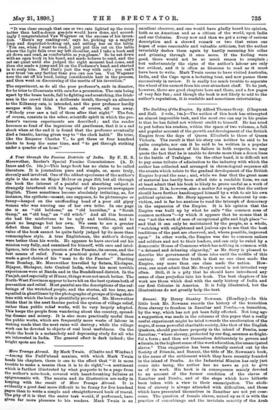A Tour through the Famine Districts of India. By F.
H. S. Merewether, Reuter's Special Famine Commissioner. (A. D. Ines and Co. 16s.)—This large book has no claim to be called literature. It is journalism pure and simple, or, more truly, slovenly and involved. One of the oddest specimens of the author's style is the note on Major McIver on page 210, but all through the book the interest of a painful and absorbing subject is strangely interfered with by vagaries of the poorest newspaper English. These sometimes become absolutely irritating, as, for instance, the epithets—meant, one supposes, to be picturesque or funny—heaped on the unoffending head of a poor old gipsy woman who was nursing one of her own tribe. In one page she is an "old beldame,' an "old harridan," a "Sarah (lamp," an "old hag," an "old witch." And all this because she had the misfortune to be ugly and toothless, and to speak no language but her own. We seem to see a greater defect than that of taste here. However, the spirit and value of the book eannot be quite fairly judged by its more than commonplace style. A true Englishman, the author's doings were better than his words. He appears to have carried out his mission very fully, and examined for himself, with care and intel- ligence, into the whole question of the Famine, its causes, and the best means of relief. From a practical point of view, Reuter made a good choice of his " man to do the Famine." Starting from Bombay, Mr. Merewether travelled by Satara, Kholapur, Bijapur, Sholapur, into Central India, where his most terrible experiences were at Banda and in the Bundelkund district. In the Punjab, and especially at Hissar, things were not much better. The North-West Provinces appear to have hit on the best system both of prevention and relief. Most painful are the descriptions of the suf- ferings of the wretched people, and the stories, all too true, are equalled in ghastliness by the photographs of groups of living skele- tons with which the book is plentifully provided. Mr. Merewether thinks that in the next famine period the system of village relief, rather than public relief works, will be very largely adopted. This keeps the people from wandering about the country, spread- ing disease and misery. It is also more practically useful than the public works, which are frequently mere waste of labour in making roads that the next rains will destroy ; while the village work can be devoted to objects of real local usefulness. On the whole the book is a melancholy and depressing study for all who are interested in India. The general effect is dark indeed ; the bright spots are few.


































 Previous page
Previous page